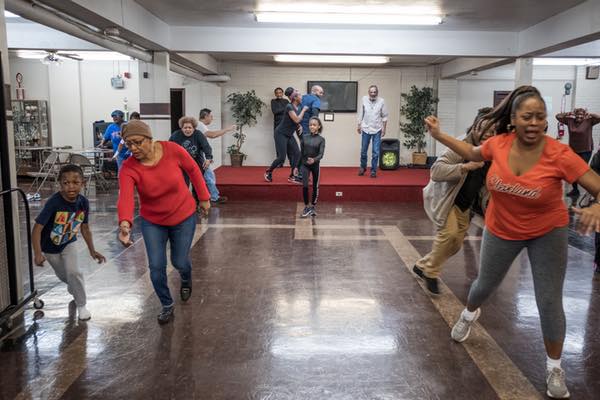Fri 2/14 @ 7PM
Sat 2/15 @ 2PM & 7PM
“Maafa,” we’re told, is a Kiswahili word that means great tragedy disaster or calamity, sometimes referred to as the African Holocaust or the Holocaust on Enslavement. It refers to the trans-Atlantic slave trade, an African-American equivalent to the Jewish Holocaust or the Palestinian Nakba.
In 1995, the word was adopted to apply to a commemoration/performance first presented at St. Paul Community Baptist Church in Brooklyn New York, intended to acknowledge the trauma of slavery so that healing could begin. As its pastor at the time, the Rev. Dr. Johnny Ray Youngblood, said in response to the question “What’s wrong with Black people?, “We have yet to mourn the loss of our ancestors.”
Not only has the initial concept has evolved over the years into a sweeping theatrical production, but other churches around the country have latched onto the concept and made it their own, adapting it to their own communities.
One of these is Cleveland’s Olivet Institutional Baptist Church in the Fairfax neighborhood, where an abbreviated version of MAAFA was previewed last February, and a full-scale version will have three performances this weekend.
Not surprisingly, at the center of it is Terrence Spivey, one of Cleveland’s most in-demand directors, a passionate theater devotee and the person most likely to set the Guinness Record for being able to talk about theater for the longest amount of time without repeating himself. Spivey wrote and directed the mix of more than 40 professionals and amateurs, many of them members of the church, who made up the cast.
The genesis of the Cleveland production came about when Olivet’s pastor, the Rev. Dr. Jawanza Colvin, contacted Spivey in the summer of 2018. He had seen the piece twice, and he asked Spivey to go up to the Brooklyn church and see the production in its original home.
“Sunday September 16 was the performance,” recalls Spivey. “I was blown away. We got back and we had a talk afterwards. I kept reaching out to the gentleman, who put it together, wrote and directed it, who was part of the original production. He stepped away and a younger man did his own version — he changed the story, but kept the MAAFA connection. No matter what story you’re writing, you want to show the journey. Whatever you wrap around you show the struggle. He said you can write your own.”
That’s what he did.
“I changed the setting and placed it in where I was born,” he says. “The famly in the place, they’re imported to Texas, not Virginia. I brought in people I knew as a child. Treadwell is a pivotal part. He’s the one who ties everything together. Treadwell as actually someone I knew, an older gentleman; we used to call him daddy Treadwell.
In this version of MAAFA, taking place in the present, the Treadwell family is joining other families for a reunion in Honey Island in Spivey’s hometown of Kountze, which here is said to be the site of a former plantation where slaves were imported. A homeless man named Zeke Treadwell uses supernatural powers to shift into the past and take 10-year-old Nia on a journey to meet her ancestors.
Many members of the congregation went with Colvin to see the production, and Spivey says they are really stoked to see (and in many cases participate in it) in their own church. Pews have been removed with the capacity of the huge church cut from 1600 to 800.
“It’s been very gratifying but exhausting, one of the most exhausting things I’ve ever worked on,” says Spivey. “I used to be able to go somewhere after rehearsal and have hamburger. But I go straight home after rehearsal I’m so exhausted. It’s very, very emotional.”
“The leads are professional actors; the ensemble are church members young and old. There are lots of kids in the play and families. I had a workshop in mid November-December of preparation. We did improvisations to get theater in their bones, to talk about history of Africa, why we are the way we are. I told the actors, the church members who are learning about theater, this is not concrete. It’s a living thing. I’m changing stuff, I’m taking stuff out.
He points to a quote from the New York play “If you see us you free us” as the essence of what he’s driving at.
“Black History Month you celebrate people who make change. But it’s never about slavery. [MAAFA] is not about celebrating it about celebrating our history but about acknowledging the resiliency and struggle of our ancestors.”
